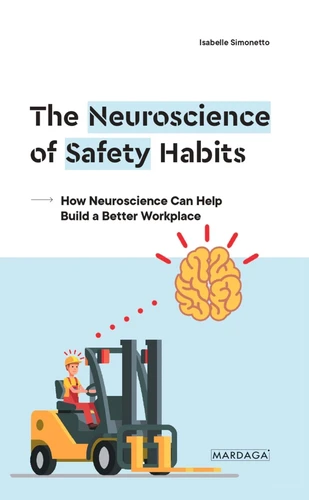The neuroscience of Safety habits
Par :Formats :
Disponible dans votre compte client Decitre ou Furet du Nord dès validation de votre commande. Le format ePub est :
- Compatible avec une lecture sur My Vivlio (smartphone, tablette, ordinateur)
- Compatible avec une lecture sur liseuses Vivlio
- Pour les liseuses autres que Vivlio, vous devez utiliser le logiciel Adobe Digital Edition. Non compatible avec la lecture sur les liseuses Kindle, Remarkable et Sony
 , qui est-ce ?
, qui est-ce ?Notre partenaire de plateforme de lecture numérique où vous retrouverez l'ensemble de vos ebooks gratuitement
Pour en savoir plus sur nos ebooks, consultez notre aide en ligne ici
- FormatePub
- ISBN978-2-8047-2470-2
- EAN9782804724702
- Date de parution28/02/2023
- Protection num.pas de protection
- Infos supplémentairesepub
- ÉditeurMardaga
- TraducteurRebecca Neal
Résumé
Why do people with experience still make errors? How can we explain the omission of a step in a process or the reversal of a sample during a medical analysis, for example? What if it's all about neuroscience?We cannot always rely on our brain. The automatisms we acquire, although indispensable, can sometimes play tricks on us and lead us to make errors, which constitutes a danger not only for ourselves, but also for others.
With the help of the latest research in neuroscience and 25 years of experience in consulting, observation of work situations and training, Isabelle Simonetto explains the functioning of the human brain in a playful, accessible and innovative way. Thanks to exercises, concrete examples and memo cards, the reader will be able to understand the various pitfalls inherent to the properties of the brain.
The author also presents practical advice and techniques that can be directly applied in all professional sectors. An indispensable book for all those who wish to improve their security and reliability in their professional and personal lives. A unique book that mobilizes neuroscience to improve the safety and management of companies! ABOUT THE AUTHORIsabelle Simonetto is a doctor in neuroscience, a lecturer and a consultant specialized in behavioral neurobiology.
Since 2006, she has been working with companies on the themes of human factor reliability, memory and emotional intelligence. She is also one of the most sought-after experts of the APM (Association pour le Progrès du Management), of which she has been a member since 2010.
With the help of the latest research in neuroscience and 25 years of experience in consulting, observation of work situations and training, Isabelle Simonetto explains the functioning of the human brain in a playful, accessible and innovative way. Thanks to exercises, concrete examples and memo cards, the reader will be able to understand the various pitfalls inherent to the properties of the brain.
The author also presents practical advice and techniques that can be directly applied in all professional sectors. An indispensable book for all those who wish to improve their security and reliability in their professional and personal lives. A unique book that mobilizes neuroscience to improve the safety and management of companies! ABOUT THE AUTHORIsabelle Simonetto is a doctor in neuroscience, a lecturer and a consultant specialized in behavioral neurobiology.
Since 2006, she has been working with companies on the themes of human factor reliability, memory and emotional intelligence. She is also one of the most sought-after experts of the APM (Association pour le Progrès du Management), of which she has been a member since 2010.
Why do people with experience still make errors? How can we explain the omission of a step in a process or the reversal of a sample during a medical analysis, for example? What if it's all about neuroscience?We cannot always rely on our brain. The automatisms we acquire, although indispensable, can sometimes play tricks on us and lead us to make errors, which constitutes a danger not only for ourselves, but also for others.
With the help of the latest research in neuroscience and 25 years of experience in consulting, observation of work situations and training, Isabelle Simonetto explains the functioning of the human brain in a playful, accessible and innovative way. Thanks to exercises, concrete examples and memo cards, the reader will be able to understand the various pitfalls inherent to the properties of the brain.
The author also presents practical advice and techniques that can be directly applied in all professional sectors. An indispensable book for all those who wish to improve their security and reliability in their professional and personal lives. A unique book that mobilizes neuroscience to improve the safety and management of companies! ABOUT THE AUTHORIsabelle Simonetto is a doctor in neuroscience, a lecturer and a consultant specialized in behavioral neurobiology.
Since 2006, she has been working with companies on the themes of human factor reliability, memory and emotional intelligence. She is also one of the most sought-after experts of the APM (Association pour le Progrès du Management), of which she has been a member since 2010.
With the help of the latest research in neuroscience and 25 years of experience in consulting, observation of work situations and training, Isabelle Simonetto explains the functioning of the human brain in a playful, accessible and innovative way. Thanks to exercises, concrete examples and memo cards, the reader will be able to understand the various pitfalls inherent to the properties of the brain.
The author also presents practical advice and techniques that can be directly applied in all professional sectors. An indispensable book for all those who wish to improve their security and reliability in their professional and personal lives. A unique book that mobilizes neuroscience to improve the safety and management of companies! ABOUT THE AUTHORIsabelle Simonetto is a doctor in neuroscience, a lecturer and a consultant specialized in behavioral neurobiology.
Since 2006, she has been working with companies on the themes of human factor reliability, memory and emotional intelligence. She is also one of the most sought-after experts of the APM (Association pour le Progrès du Management), of which she has been a member since 2010.






